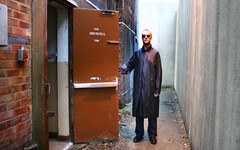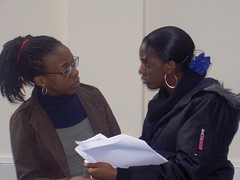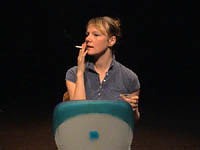PELAGEA VLASSOVA: Gherkins, tobacco, tea, fresh pasties!
IVAN: And the wrapping paper is the best part.
PELAGEA VLASSOVA: Gherkins, tobacco, tea, fresh pasties!
IVAN: And the wrapping paper is free.
A WORKER: Got any gherkins?
PELAGEA VLASSOVA: Gherkins, yes here you are.
IVAN: And the wrapping paper mustn't be thrown away.
PELAGEA VLASSOVA: Gherkins, tobacco, tea, fresh pasties!
A WORKER: What's so special about what's printed on the wrapping paper? I can't read.
ANOTHER WORKER: How do I know what's on your wrapping paper?
FIRST WORKER: You're holding one clever.
SECOND WORKER: Quite right, it says something,
FIRST WORKER: So, what?
SECOND WORKER: Good for them, they say if we get drawn into negotiating the more fools us.
PELAGEA VLASSOVA (Crosses the yard): Gherkins, tobacco, tea, fresh pasties!
THIRD WORKER Here they are, with the police after them and factory security tightened up, and here's another pamphlet just the same. They know what they're doing that lot and nobody's going to stop them. There's somehthing in what they say.
AnalysisCooking on Gas again after Rocky Friday - everyone had been tired and fractious at the end of a long week and we'd bitten off too big and too complicated a chunk of scene to chew.
Today, Monday March 7th, though, we look at 'The Swamp' scene again. In particular the scene between Workers One and Two. By focusing on such a 'detail' we can happily spend over an hour and still not get all the way to the bottom of things. We learn to ask questions: Is the gherkin that Vlassova dropped earlier in front of the Gatekeeper, wrapped? We'd had it wrapped before (we'd been talking about detail, but had we thought deeply enough about it?). We decided, in fact, that it shouldn't. If it had been wrappped the Gatekeeper might have been litererate, read it and the whole operation would have been sabotaged.
We ask, in particular, why the Second Worker says: 'How do I know what's written on your wrapping paper?' We'd already established, through asking a number of other questions of ourselves AND FROM INFORMATION IN THE TEXT ONLY, that
1. Pelagea had delivered to the factory before.
2. That there is, therefore, nothing strange for the men to see her selling stuff there.
3. That the men know who Ivan is. Also that he is a Marxist, a revolutionary and against doing deals with the management.
4. That they all know that the cut in wages is imminent and that at that very moment Karpov is having a meeting with the management and will be coming out shortly to tell them how it's gone.
5. That this is not, therefore, just any old lunch break.
6. That what IS strange and new, however, is Ivan wrapping the Canteen lady's goods.
7. That even before Worker One gets the wrapping paper in his hand he knows that he's getting a leaflet.
8. So does Worker Two. The only problem for Worker Two is: He can't read it.
9. That Worker One will have spotted that Ivan has a lot of 'wrapping paper', that they are all the same and that all the other people who get food will have the same 'wrapping paper' too.
So, why does he say: How do I know what's written on your wrapping paper?
Strange? Not really. BECAUSE S/HE IS TOO BUSY READING WHAT THE WRAPPING PAPER SAYS TO HEAR THE QUESTION. The next line makes it doubly clear: "Quite right, it says something.' And 1st Worker's: "So, what?" also makes clear that she wants to know too. The Second Worker's "Good for them" is actually about WHAT SHE'S READING IN THE TEXT. SHE'S AGREEING WITH WHAT IT SAYS. She then turns to to Worker One and informs her: "they say if we get drawn into negotiations the more fools us."
The picture of Nuria and Tanya shows that Gestic Moment.
Tanya (Worker 2) has the leaflet in her hand; she has the information. She looks strong, clear and determined. Nuria WANTS the information - she appears less strong and she's leaning more than Tanya. However, she's looking straight at her, she's engaged and she looks as if she wants that information. And it's clear that Worker Two is not about to withold it it from her. Both are open to one another.
What is nice here is that this little episode is also an example of Brecht's SPASS, German for 'Fun'. First Worker's response: "You're holding one clever", indicates that both workers know one another and can 'josh' and tease one another. Brecht humanises them. They are not 'cyphers' : The Workers. They are not robotic automatons. They are two workmates with a sense of humour - and are made from real flesh and blood.
And so, from our careful - and patient - archaelogy of the text, we have excavated the scene ... The relationships of the characters emerge. But also the economic and historical relationships. The heart of this unit is not where we perhaps first thought it was. That it's not about Ivan and Pelagea but about two (and then three) workers' attitude to the strike.
In point of fact, they are all three for it. And had been even before Pelagea turned up. They haven't been 'converted' to the strike, or tricked into it by the revolutionaries. But they do want to know what the leaflet says.
And that was another thing we discover: the leaflet does not just say: 'STRIKE! TOMORROW! 9.00. DON'T BE LATE'. No, it contains a case. Arguments. Why the strike should be called. What others might say to stop it. Why their ideas have to be resisted.
And the three workers we see are hungry for this information. In the next unit (Karpov's speech) and the following song we can deduct that these workers are ALREADY highly politicised (not by the revolutionaries but by the situation) and in the next scene Ivan tells Pelagea that the strike vote was almost 100%.
Furthermore, in Scene Five we can see that the whole economic and political situation is highly volatile. There are troops on the street. The police are armed. And they shoot. All these 'little' events in this one 'little' factory are not isolated but part of something massive, perhaps cataclysmic that's sweeping the whole country, unless the authorities can keep the lid on it.
Even in Russia, even in 1900, troops didn't shoot people in the street every day of the week. In good times, a good worker can eat. And so can her children.
It's interesting to think, by the way, that these event are taking place at almost the same moment in time as the events in The Seagull, Three Sisters and Uncle Vanya.
In the same country - the same country, which is another country.
While Vanya is bleating on about the fact that he's 47 and hasn't done much with his life or Nina dreams of being an actress, the Suchlinov workers don't know whether they eat tomorrow and Smilgin lies dead in the street, a police bullet through his heart.




